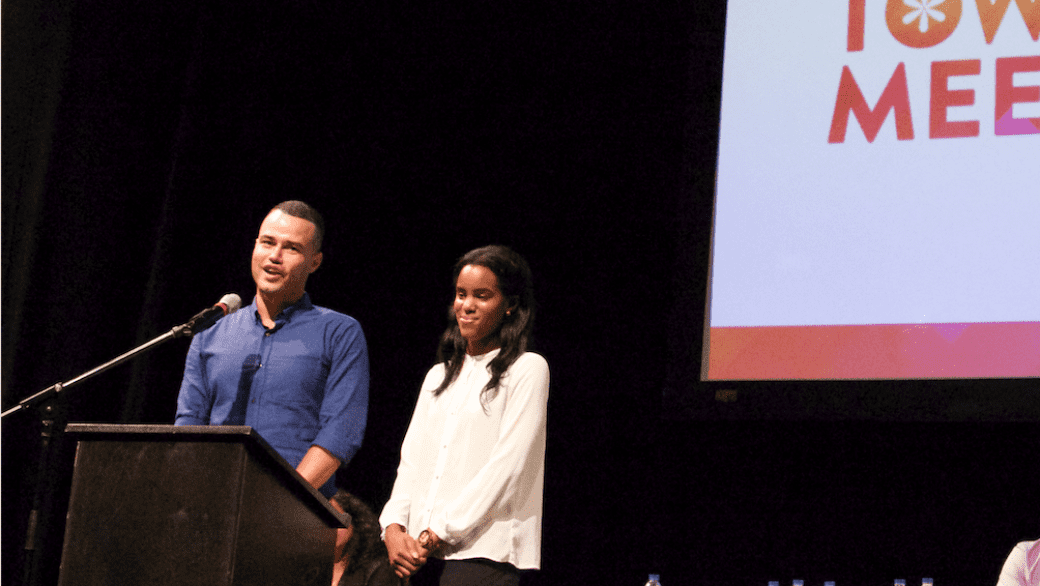During Pride Toronto’s town hall on Tuesday, a man went up to the microphone and asked the audience a question.
“I want all of you guys to raise your hands. How many of you all have faced violence because of the police?”
Dozens of hands shot up in the air. They were overwhelmingly black.
That moment captured much of the mood during the first night of Pride Toronto’s community consultation on Aug 30, 2016, in the wake of Black Lives Matter Toronto’s (BLMTO) protest during this year’s parade.
While Pride Toronto has been criticized by both supporters and critics of BLMTO, the community members that participated in Tuesday’s forum kept the focus on police violence and what they said was Pride Toronto’s continued marginalization of black queer and trans communities.
“That black folks continually get displaced whenever funds or resources come into our communities is so deeply fucked up,” said Lali Mohamed.
Pride Toronto also came under fire for not responding to the concerns of deaf people, seniors, youth, sex workers, homeless people, Latinx people and people with disabilities.
Of the dozens of people who spoke at Ada Slaight Hall at Daniels Spectrum, only a handful expressed reservations about excluding police from future Pride parades.
“Some people feel afraid of having the police in the parade and some people feel afraid not having the police in the parade,” said Maurice Tomlinson, a lawyer currently challenging Jamaica’s sodomy laws. “Those are two truths which we have to accept.”
BLMTO demands
The town hall, which was the first of two that will take place this week, was organized after Pride Toronto agreed to, and then publicly reneged on, commitments made to BLMTO during their Pride parade protest. Those promises included greater autonomy and funding for community stages, increased commitments to accessibility and the exclusion of police floats from future parades.
Alica Hall, co-chair of Pride Toronto, told the assembly that comments made by former executive director Mathieu Chantelois immediately after the Pride parade did not reflect the views of Pride Toronto.
“Following the parade, comments were made in the media that suggested we had no intention of meeting these demands,” she said. “Let me be clear in saying those comments misrepresented our organization’s position.”
Hall said that while Pride Toronto has agreed to the vast majority of those demands and can implement them, the exclusion of police, by far the most contentious issue, will be dealt with through the organization’s official dispute resolution process.
BLMTO’s demand to remove police floats is being treated as a submission to that process, said Hall.
That process was created in the aftermath of the multi-year debates around the inclusion of Queers Against Israeli Apartheid in the parade.
Pride Toronto will compile the feedback from the two town halls, surveys distributed both at the meeting and online, as well as emails sent to the organization over the past two months.
Blackness Yes!
For Syrus Marcus Ware, a 14-year veteran of Blackness Yes!, this town hall meeting felt familiar.
In 2010, after Blockorama was going to be moved for the third time in four years, supporters of Blackness Yes! held a town hall that called on Pride Toronto to address their concerns.
“We put forward demands that feel very reminiscent to the demands that we helped to co-write with Black Lives Matter,” Ware told Daily Xtra after the town hall concluded. “We keep coming together for more discussion and consultation when we already — all of us — already know what the problem is.”
“There is systemic racism, anti-blackness embedded in this organization and more broadly embedded in our society and within the LGBT community,” Ware continued. “So that’s the problem and unless we’re doing anything to address that particular topic, everything else is just words, everything else is just talk.”
Ware didn’t believe that the consultation adequately addressed the concerns brought up by BLMTO.
“I don’t think this consultation tonight necessarily did anything to address anti-blackness in the way that it was framed because we actually didn’t even address that we were going to be talking about blackness, despite the fact that obviously was the topic.”
Instead, the town hall had been billed as feedback on creating a “safe and inclusive Pride festival.”
But Ware was heartened by the support and openness of most of the participants.
“People gave of their time and of their words and that is something we can hold onto, that was a beautiful thing that came out of tonight,” he said.
Ware emphasized that though Blackness Yes! wants to make Pride Toronto accountable to black queer and trans communities, leaving the Pride umbrella is never off the table.
“More and more this organization is showing that it’s not ready to meet the needs of all black queer and trans people and all queer and trans people in Toronto,” he said. “And what we do know is that if an organization isn’t serving its members, sometimes it’s time to end.”

 Why you can trust Xtra
Why you can trust Xtra


